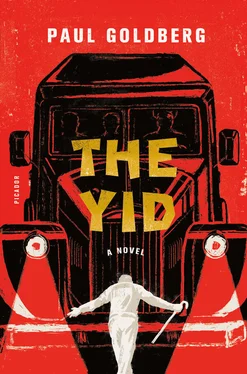Do these madmen believe that they will kill the czar deep inside his fortress? What is the plan? Will there be scaling of the walls?
Country venues make regicide easier, and transit is good. Alexander II was offed in a carriage, Franz Ferdinand in a car, Nicholas II in a provincial house, Lenin — probably something similar.
Kima is not equipped to see the bullet that will kill her. Revenge is all she wants. The rest is details.
Ol’ga Fyodorovna has a cirrocumulus cloud in her head, her thoughts detached and fluffy.
Lewis, too, is irrelevant, but in a fundamentally different way. He breathes logistics, but what logistics can there be in dreams of blood?
Kogan is another story. He is useful. He feels history’s pulse as his own. They magnify each other, Levinson and Kogan, as actors do.
The curtain rises to reveal an ensemble of two old men and sundry stragglers.
KOGAN: Ol’ga Fyodorovna, if we really want to find Comrade Stalin, we shouldn’t try the Kremlin. I say we try the dacha.
LEWIS: Are you certain, Aleksandr Sergeyevich? Where is it?
KOGAN: He has been indisposed. “Demented” is the pitiless clinical term. Indeed, maniacal. More than before, that is. The classic regimen is limited public appearances. Not much travel. Confinement. Self-imposed, of course. He’s still the liege. His isolation stems from paranoia.
LEVINSON: How do you know this?
KOGAN: The doctor grapevine.
LEWIS: Have you been there?
KOGAN: His dacha? No, thank you. But colleagues from Kremlyovka have, over the years. Not recently. His personal physician Vinogradov and I have mutual acquaintances. Doctors gossip. Let me revise that: doctors gossip ed .
To tell the rest of the story — i.e., the current place of residence of Dr. Vinogradov — Kogan extends the index and middle fingers of his left hand and crosses them with the index and middle fingers of his right, making a miniature likeness of a prison window.
LEVINSON: Of course, you would be the sort to know the murderers in white coats.
This line is Kogan’s cue to bow.
KOGAN: I do my best. [“ Starayemsya” is the exact word he uses.] I had the privilege to call them friends and colleagues. Dreadfully clueless, hopelessly innocent. Naïve, unfit to plot, and thus distinct from our komandir .
LEVINSON: You know where it is? His dacha.
KOGAN: I can deduce. Some years ago, I treated Madame Merzhanov, the wife of Miron Merzhanov, the architect whose specialty was designing Stalin’s retreats and sanitaria for NKVD, or MVD, or whatever is the acronym de jour … I did my best for her, and she did well, but ended up in prison. And died, as per tradition. The dacha is in Kuntsevo. Accessible by secret road, I understand.
LEVINSON: Kogan, my friend, I hope you are right about the dacha. We will not get two tries.
* * *
Turning to costumes, Levinson decides that the women look more believable in the part of young conscripts.
With no obvious regret, Ol’ga Fyodorovna exchanges her haircut for that of a conscript and dons the loathed uniform of one of Lieutenant Sadykov’s boys. An identical uniform is laid out in front of Kima.
Again, Levinson puts on the uniform of a lieutenant of state security; Lewis wears one of his own gabardine suits; and Kogan, in expertly applied blackface, wears Kima’s blue dress.
KOGAN: Do I look like a minstrel, Mr. Lewis?
LEWIS: A minstrel … a little. More like a shtetl harlot.
KOGAN: A kurve? I want a red wig now.
Since no one laughs, he lifts his skirt to mid-thigh.
KOGAN: How about tefillin for my legs, like Zuskin?
Still no reaction.
LEVINSON: I thought I had more time to write the play.
He looks absurd. His limbs are far too long to fit inside Sadykov’s pants and tunic.
KOGAN (lowering the hem) : We’ll help you as we go.
LEVINSON: I’ll split up what I have.
KOGAN: We’ll improvise the rest.
OL’GA FYODOROVNA: I know that Jews believe that with knowledge of God’s name, and with a proper incantation, a man can make himself unseen. You think you know the name and incantation?
LEVINSON: They don’t exist.
LEWIS: We’ll see.
KOGAN: You are insane.
LEVINSON: And you are alive. They can’t defend themselves from that which they can’t see. I hear that when Stalin travels, he takes an entourage of seven hundred guards, who take positions around his dachas in three concentric circles.
KOGAN: That’s preparation for a military assault.
LEVINSON: But we’ll evade them, comrades.
KOGAN: By means of what? The Kabbalah?
LEVINSON: We’ll blind them with a story. It takes a piece of paper, and here it is. I have handwriting of the sort we need.
Within a minute, the paper starts to tell the story:
Arrest Paul Robeson. Bring for personal interrogation.
The signature is clean and bold: I. Stalin.
LEWIS: This is fine work. Have you been planning this?
LEVINSON: I had no time to plan.
* * *
The Black Maria stands undisturbed where Lewis left it in the early morning of Wednesday, February 25.
With every snowfall, people have made fresh paths around the ominous truck.
On March 1, at midnight, a slightly stooped old man dressed in an ill-fitting uniform of a lieutenant of state security walks past the kolkhoz market gates, gets in the truck, and guns its engine.
Kima, wearing an overcoat of one of Sadykov’s boys, waits behind a birch tree at Kogan’s gate. After seeing the headlights and hearing the engine, she runs inside to tell the Negroes and Ol’ga Fyodorovna that it is time to go.
* * *
At night, with no traffic, a Black Maria traveling at the speed of thirty-five kilometers per hour can cover the distance between Malakhovka and Kuntsevo in a bit under four hours.
Near the cemetery, the Black Maria turns onto the Nizhegorod Shosse. The time is 0:31 a.m.
KOGAN: Is something gnawing on you, Lewis?
LEWIS: Let’s imagine for a moment that Stalin is where we think he is, that we don’t get liquidated before we reach him, that we do assassinate him, and even that we survive and that we get away. Then what? Remember Lady Macbeth? She was destroyed by her bloody deed. As was your Boris Godunov.
OL’GA FYODOROVNA: I love Boris Godunov.
LEWIS: I mal’chiki krovavye v glazakh. [The blood-bathed boys before my eyes.] Pushkin has Boris admit to hallucinations about the czarevitch he murdered. Regicide causes madness.
LEVINSON: Idiots! Prisons and madhouses are full of people who allowed opera to define their behavior. When you kill, you kill. Life’s life, death’s death.
KOGAN: Don’t blame opera, komadir . Read Pushkin’s play. The word komedia is in the title, and yet it has been missed for a century and change.
Boris Godunov is Pushkin channeling Shakespeare, and operatic foolery, and what have you, in a crazy romp. Macbeth made Russian — and made funny, or funni er . Why do we kill? We kill for laughs, and then by laughs we die.
You know, Lewis, I suggest that you work harder to squeeze the inner Shakespeare out of yourself.
LEVINSON: Squeeze him out drop by drop. This is Mother Russia. It’s not Shakespearean terrain. We are not liquidating one monarch to install another.
KOGAN: Yes, Mr. Frederich Lewis, you are not in line to become Frederick I, the Emperor of all Russia.
OL’GA FYODOROVNA: That name’s been used. The Grand Duke of Baden was Frederick I. I’m not mistaken.
LEVINSON: I saw your Paul Robeson in Emperor Jones, by the way. It was a similar story …
LEWIS: Fuck you.
LEVINSON: Fek you, fek you. If all goes well, we will remain unseen, and unseen we will leave.
Читать дальше












